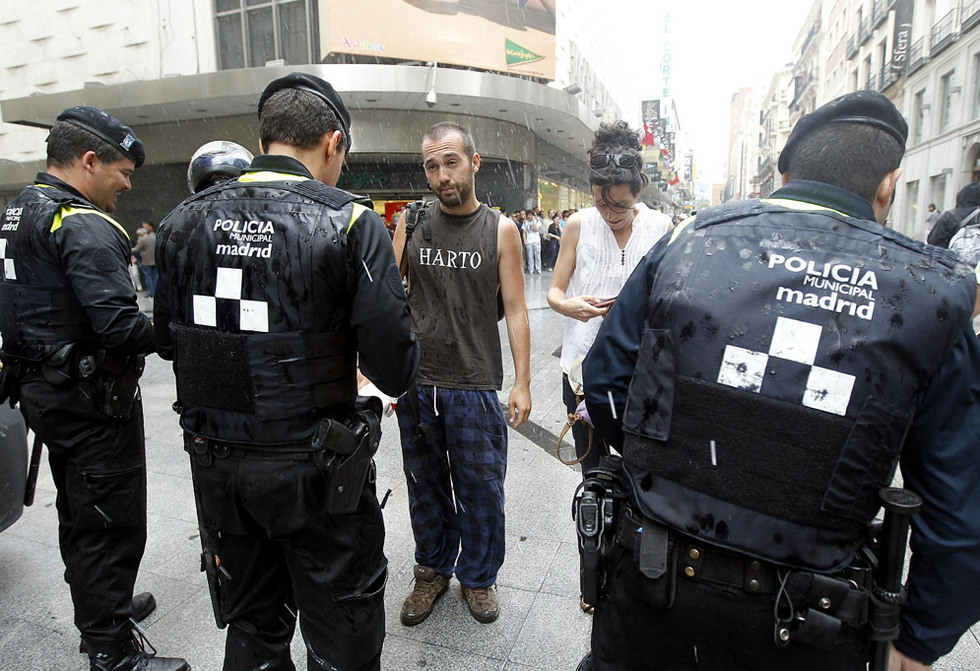Male, young, belonging to an ethnic minority, Muslim and not heterosexual. Those EU citizens who fall under these labels are more likely to be stopped on the street by the police in the different countries of the European Union (EU). This is how the EU Fundamental Rights Agency (FRA) in a report of 32 pages published this Tuesday, coinciding with the first anniversary of the death of African American George Floyd – an event that spurred the global anti-racism movement Black Lives Matter – at the hands of a white policeman in Minneapolis (United States). ). “It is time to rebuild trust between all communities and ensure that police arrests are always fair, justified and proportionate,” said Michael O’Flaherty, director of the FRA, in a statement.
Of the 32,537 respondents – all of them over 16 years of age – men are the most likely to be for the police in the EU, 18%, compared to 10% of women. The age group most scrutinized by the authorities is between 16 and 29 years old (21%); and those with the least, those over 65 (6%). But the most compelling data are those relative to appearance: 22% of those who declare themselves to belong to an ethnic minority claim to have been stopped on the street at some time by the police. It is followed by 20% of Muslims and those who declare themselves “not heterosexual”, with another 20%.
“Police can legitimately detain people for a variety of reasons … But discriminatory profiling, where, for example, race or ethnicity is the only basis for detaining someone is illegal,” say the authors from the first study Your rights matter: Police stops, Fundamental Rights Survey (Your Rights Matter: Police Detentions, Fundamental Rights Survey) that compares these practices for the first time in the 27 EU countries, the United Kingdom and North Macedonia, according to the FRA, based in Vienna (Austria). For example, in southern countries such as Spain or Malta, law enforcement agencies tend to stop people on the street less: 4% and 7% of those surveyed, respectively. In the north of the Old Continent they are stricter: they stop 21% of those surveyed in Ireland and 24% in Estonia, according to the survey carried out between 2018 and 2019 and on which the study is based.
The Austrian police are the ones that search the most people on the street within the EU: 25% of the sample. It is the country of the Alps that reaches discriminatory maximums with 49% of migrants or descendants of sub-Saharan Africans who are stopped. The differences found in the ways that the Austrian police stop a citizen to ask for documentation are striking. The study reveals that 87% of the general population is intercepted by the authorities by car, while 72% of Sub-Saharan Africans or those of Sub-Saharan descent are intercepted while walking. In addition, the latter are asked more for identity cards than those considered by the study as the “general population”.
The gypsy ethnic group is the one that suffers the most discrimination on the street compared to the general population in Croatia – 33% of those who belong to this community have been arrested by the authorities compared to 10% of the rest of the citizens – and also in the countries Low, where that ratio is 29% to 10%. In Italy, however, the group most registered by law enforcement on the street are those from North Africa. 29% of that population group has ever been stopped by the security forces, compared to only 12% of the general population. In countries like France and Germany, discrimination when conducting a police search in the middle of the street is the least in the EU.
It is also striking that the educational level does not seem to influence the result of the survey. In fact, it is the people with the highest level of education who have been stopped the most by the forces of order (15%), compared to 11% of those who declare that they have only a secondary education or less. Police records also do not differentiate between unemployed or employed. They are located in 17% between both groups.
80% of respondents in the 27 EU countries say that whenever the police have stopped them for a search they have been treated in a respectful way. Of course, only in cases where they were inside the vehicle. In contrast, 60% of those who were stopped while walking down the street maintain that they were treated correctly. This percentage drops to 46% when it comes to people who belong to an ethnic minority.
The degree of respect perceived by citizens when they are attended by the police varies considerably between the north and the south of the EU. In Sweden, Finland and Denmark, satisfaction with the treatment of agents always exceeds 86%, while in countries such as Slovakia, Bulgaria and Romania, this degree of citizen satisfaction with the treatment of agents is around 47%. Citizens belonging to the gypsy ethnic group who have ever been stopped in the street by the police are those who show the least confidence towards the authorities with a score of 2.8, where 10 is the highest level. A level not reached by any group.

